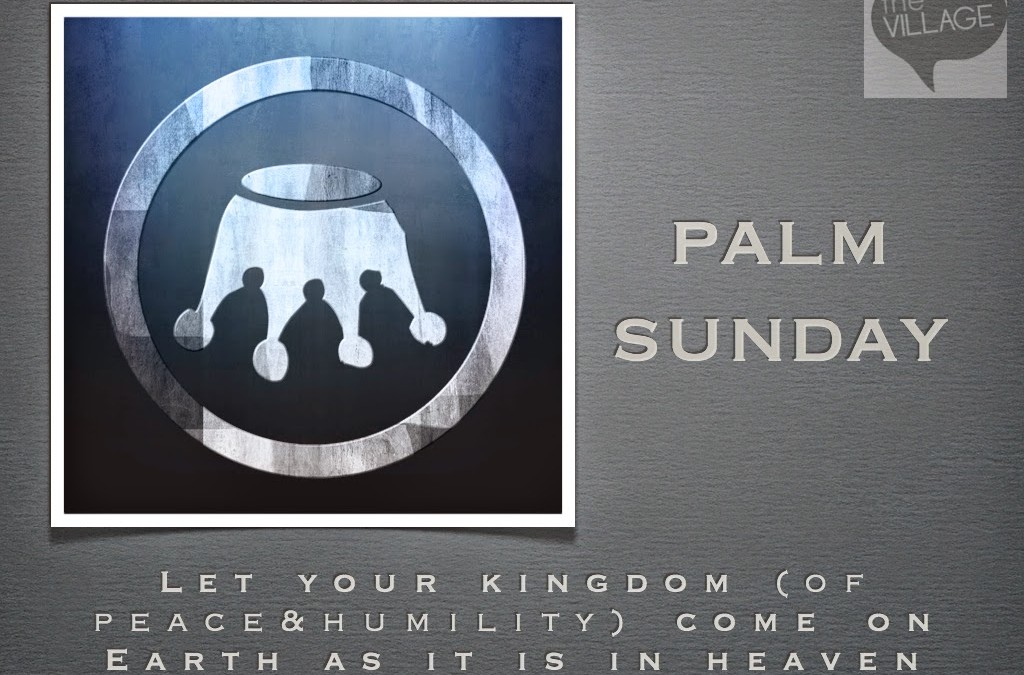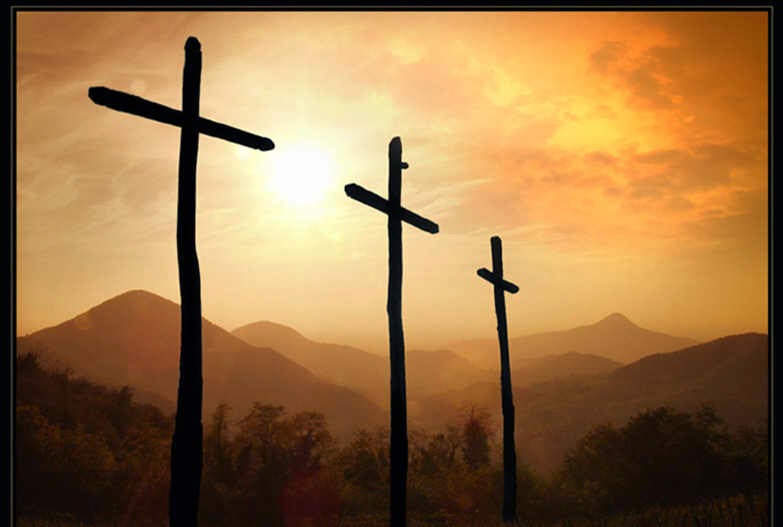
by Jonathan Manafo | Apr 15, 2014 | Sunday Conversations
Before we get to Sunday…which by the way is the best and most important reason to be happy…lets take this (holy) week in. Moving from Palm Sunday to Good Friday is a reflective journey that helps us appreciate who Jesus is, what Jesus did, and how the world is ‘saved’ ‘rescued’ and ‘delivered’ in and through him. Palm Sunday starts us off. We begin the journey as Jesus did. Just like we could interpret the joy of the crowd as affirmative, so to we can rush to the conclusion that all was well and the party had already begun.
The resurrection is the party of parties. The reason we celebrate is because of how dark Friday was. The light of Sunday is bright because of the shadow cast by Friday. Take it in, let it affect you, let it hit you deep. It will allow us to appreciate Sunday all the more.
What will you do, how will you pray, what more will you sacrifice, to identify with the suffering of Jesus? This week, this Friday, think about the darkness, the shadows, the grief, and the pain, all for the sake of the world. Sunday will be here before you know it, but in order to appreciate the party of (his) resurrection, stop to appreciate the reality of (his) death.

by Jonathan Manafo | Apr 8, 2014 | Sunday Conversations
 Too many people in our culture have the misconception that encountering Jesus is like going to a job interview – impress the boss to get the nod. Some how you feel you have to impress God enough for him to invite into his house for the big party on Friday night. We wouldn’t all admit it, but perhaps if we realized the walls between humanity and God have already come down, then we’d attempt to discover who he is and what he offers in and through Jesus.
Too many people in our culture have the misconception that encountering Jesus is like going to a job interview – impress the boss to get the nod. Some how you feel you have to impress God enough for him to invite into his house for the big party on Friday night. We wouldn’t all admit it, but perhaps if we realized the walls between humanity and God have already come down, then we’d attempt to discover who he is and what he offers in and through Jesus.
Acts 16 lets us in on 3 characters who encounter Jesus. They all come to God’s story from different angles, non of them perfect, all of them in need.
Lydia’s a business woman who has been gathering with other God-fearers (people attracted to God’s story, but don’t feel any need to become Jewish). Paul finds her, not at a synagogue, where we’ve seen him and Silas go to when they arrive in various towns, but by a river where people (women) meet to pray. Philippi is a (very) Roman city (a leading city they say). It would be hard pressed to find 10 Jewish men to make quorum in order to officially have synagogue. So people intrigued with God’s story becoming their story gather outside the city to pray. It’s here that Lydia hears Paul’s explanation of Jesus and when ‘God opens her heart’ she jumps in – fully committed. Lydia becomes an influential person in the New Testament – it’s her home that hosts the first church in Philippi.
Paul & Silas then meet a slave girl who is demon possessed. She follows them around telling everyone what Paul & Silas are up to. Paul gets so frustrated (annoyed) that he calls the demon out of her. Instantly she is freed from her prison. This leads to some serious trouble for Paul & Silas. The slave girl’s owners are ticked that they’ve lost profit on the slave girls gift (which she had via the demon) of predicting the future, so they see to it that Paul & Silas are flogged, Stripped, Beat up, and put in Prison. Don’t forget that in this part of the story a girl who is troubled by evil is set free by the power of Jesus, through Paul.
In comes character number three. While Paul & Silas are in jail (singing hymns I might add), an earthquake occurs and releases them from their chains. The prison warden is scared of the trouble he will get into and thinks that taking his life is the best option. Paul & Silas surprise him by revealing that they haven’t gone anywhere. This (along with open mic songs on night one in prison) must impress and inspire the warden, and leads him to ask the question: ‘What must I do to be saved?’ It’s worth noting that salvation for the warden wasn’t what we think it to be. At that moment, in his present darkness, salvation meant ‘help me right now’. We know salvation to be about eternity with God. This is true, but salvation for that warden meant something very practical, ‘what must I do to get out of this mess?’. The gospel answers those questions too. The Warden (and his family) are baptized. His life takes a new direction, as did Lydia’s, as did the slave girl.
God’s story is the same, but how we encounter it is different. Our way to God is the same – Jesus, but our way to Jesus is often very different. God opened Lydia’s heart; He ripped out a demon out of the slave girl’s heart; And in the case of the warden, he inspires a question, because of the actions of Paul & Silas, that leads to salvation through Jesus.
No matter where we find ourselves, where we come from, what our bank account says, what our report cards said – no matter where we’re from or what we’ve done – God can open our heart and lead us to ask the question of all questions, ‘what must I do to be saved?’ To that question, it’s not simplistic or unintelligent or even foolish to say, Jesus is the Answer. I’ve always thought that there are more questions than answers, and I’m comfortable with that. However, I do believe that Jesus is the answer, to Lydia’s searching, the slave girl’s troubles, the Wardens fear, and more importantly to your (and my) question about faith and life and God.
As complicated and imperfect as my life gets, I believe that where ever I am, Jesus meets me there. He fixes my brokenness. He is my answer.
A business woman, a slave girl and a prison warden walk into a bar. The bartender says, what do you want to drink? They each go into long stories about why they are thirsty. The bartender says, I have the perfect drink for you…

by Jonathan Manafo | Apr 1, 2014 | Sunday Conversations
“Why do you have to make things so complicated…?” Avril Lavigne screams these words out in the rock anthem that made her so popular a few years ago. The song is about a relationship…a complicated one at that? Not sure if it led to a break up or not, but the frustration was definitely mounting. Break ups aren’t fun. They are difficult, sad, hard, and of course, complicated. You’re either the one dropping the news, or the one receiving the news. We all know what side we’d rather be on? Well, neither really. Mutual breakups are best, because at least they make more sense. I’d refer to a hollywood flick for this, but the movie Break Up ends with Vince Vaughn & Jennifer Aniston getting back together, so I’m not sure it’s worth the mention (too late).
The tale end of Acts 15 invites us into another conflict in Acts. This one isn’t a community conflict, but a personal one. Things between Paul & Barnabas get complicated. They are serving the church together – sharing the gospel together – on mission together. But something comes in the way. It’s a former character from Acts 13. John Mark seems to be back on the scene, only because he’s invited by Barnabas. Paul, however, wants nothing to do with him. Paul is still upset about John Mark ditching him and Barnabas on their first mission (13:13). Barnabas is one of those guys who sees the best in others and wants to give John Mark another chance. Luke, the writer, describes this as a nasty disagreement. 15:39 says, “They had such a sharp disagreement, that they parted company”(NIV) “Tempers flared and they ended up going their separate ways”(MSG) “Their difference of opinion was so heated…”(VOICE).

How can we do anything but appreciate Luke’s transparency in this narrative? Writers of history always have a choice, they can say it how it ‘was’ or direct us to their desired end. When thinking critically about the Bible, we have to ask questions like, ‘did they leave anything out of this?’ or ‘why was this mentioned and not this?’. Luke, with integrity to the story and to the gospel, leaves this in the story. Two apostles disagree, get into a heated debate (the original language suggests this) and part ways. How is that consistent with the gospel message of peace? It’s not, but it happens. The next question is this, did God allow it to happen, or did he gracefully provide another way to continue the forward motion of the gospel?
I don’t think God plans disputes (most of the time). But what God does do well is turn complicated messes into things of beauty. God takes my complicated ‘present’ and turns it into a hopeful ‘future’. Do I deserve it? No? But that is what grace is all about. We don’t know what is around the corner, but God does. Even if I only see the mess, it doesn’t mean that around the corner something beautiful is not brewing.
How do we know this to be true from this story. A few things…
– Paul finds a new partner and sees success immediately (churches strengthened and encouraged)
– One group of two became two groups of two. Divide and conquer rang true here. (even after a messy breakup)
– Timothy is there as Paul arrives to his next destination (Lystra). Timothy needs Paul and Paul needs Timothy. Paul calls him his son in 1 Cor 4:17 and says there’s no one like him in Phil 2:20. Timothy’s father (a Greek) is thought to be dead so Paul takes him under his wing…as a son and ministry partner.
– Side note: we often think that the Bible teaches us what to do, this is true, but in this case we learn what not to do by observing a heated debate between two friends. We also see that God’s grace is bigger than our mess-ups.
What do we take home? God takes our complicated and turns it into hope; He turns our mess into something beautiful; he provides people along the way (like Timothy) who make you look back and say, ‘only God could’ve put this together’.
Next time you scream at the top of your lungs, “Why do you have to make things so complicated?”, know that God sees it, grieves it, and then (only the way that he can) offers an alternative ending to your breakup or your mess.
Three times in 11 verses we read something like this, “The churches were strengthened and encouraged and continued to grow”. How, in the middle of a complicated situation could this happen? Only God!
– – – – – – – – – – – – – – – – – – – – – – – – – – – – – – – – – – – – – – – – – – – – – – – – – – – – – – – – – – – – – – – – –
small(er) group questions:
Can you think of a complicated situation that potentially derailed some progress you may have been making at that time in your life? Something that made you question a few things?
What do you make of Paul & Barnabas’s dispute (Acts 15:39)? How does it make you feel when you reconcile that with a gospel of peace?
How does one explain honest parts of the biblical story? The ugly parts? The ones with breakups, deaths, uncertain conclusions? (Luke leaves this in on purpose)
The beginning of Acts 16 shows… as “Paul arrived…” “Timothy was there…”
– Can you relate to this? As you turn the corner, God has something/someone waiting for you?
Read Acts 16:1-5 (focusing on verse 3). In light of what we talked about last week, what is confusing about this text? How can we reconcile it?
(hint: look at 1 Corinthians 9:19-22)

by Jonathan Manafo | Mar 25, 2014 | Sunday Conversations
How frustrating is it when you think a conflict has been settled, but then in a meeting or a family gathering or with your spouse, the conflict pops up again? You’re thinking, ‘seriously? I thought this deal was done?’.
Conflict happens, it always pops up. Not just in strained relationships, but in all relationships. All good, healthy, and loving relationships will have conflict. It’s not ‘if’ but ‘when’, and because of that, the best thing to do is address it, deal with it (wisely), and move forward.
Acts 15 is a reminder that issues have a way of creeping back into the mix. The issue of circumcision, and the expectations placed on Gentiles in the early church was a huge deal. ‘Certain people’ and ‘some believers’ just can’t let go of it. These of course are Jewish believers, and the ones who are very tied to tradition and law. Here’s where the conflict comes in, from the day of pentecost (Acts 2) and onward (Acts 10,11) God has been pulling (leading) the early church forward. Jesus of course breaks the ‘rules’ (per say) with his life, ministry, death and resurrection. In Acts we see that Jesus, through these early disciples and apostles are doing the same thing.
The Conflict: The Jewish believers (connected to the party of the Pharisees) are still hung up with ‘circumcision’ being a rite of passage into God’s family. To be fair, this is a long standing tradition. However, the new reality is that God embraces and accepts people into his family (now) by faith and not by works. Circumcision is an external sign, and the early church is learning, through experience, through revelation and through OT prophets (Amos 9) that God’s doors are wide open to everyone, not just Jews.
The apostles address the issue in 3 ways: Stories, Revelation & the OT prophecies. The people who are centre stage here are Paul & Barnabas, Peter, and the closer in for the save is James (the brother of Jesus).
– Paul & Barnabas use stories about how God has been doing amazing things within the Gentiles
– Peter does the same, while also looking back to a dream God used to rebuke his closed mind to the Gentiles and the Law.
– James pulls all the stories together, adds Amos 9:11-12, and comes to a decision.
A letter is written and sent to Gentile believers. James says that ‘we should not make it difficult for the Gentiles who are turning to God’. Explanation: lose the knife, add the grace. He also goes on to say that the gentiles should at least follow these 4 guidelines: no food that’s been sacrificed to idols, don’t eat animals that have been strangled, don’t drink blood, and don’t commit fornication or adultery.
It seems strange that James would put aside one (huge) law while adding four more. We can see this as a compromise for the sake of community, with a touch of godly living mixed in. We can agree that if fornication & adultery was a common practice among gentiles (mainly the use of prostitutes for pleasure), then saying goodbye to that behaviour is a good thing (yes?). We can also agree that the pagan rituals of drinking blood from strangled animals may not be the best way to live either. (this was a practice that set apart pagans from jews). However, the first guideline may be strange. This also seems like a conflict that should’ve been resolved in Acts 10-11. We could say that James wants to keep peace and community alive and well. So when Gentiles are with Jews, they would do well to not bug them with this freedom to eat these meats. For the sake of community.
The take home: God is moving us forward. Conflicts are normal, but sweeping things under and not addressing them is unhealthy. God doesn’t (necessarily) send conflict, but he/we can use it to move forward towards Him. Up until this point in Acts, we’ve seen a church that has moved from the temple to the courts, from the courts to the streets, from certain laws to an abundance of grace and freedom. Why, because God is moving them forward, and by doing so, making room, providing the way for others (the whole world in fact) to experience forgiveness and life in Jesus.
Two questions to think about here…
– When conflict comes, will you embrace it, address, and allow it to change you and your situation – to move you forward?
– If God is moving us forward, is there anything he’s asking us to let go of, in order for us to get there?
extra quotes to think about…
Having a sense of being loved deeply by Christ allows us to forgive when someone wrongs us because we can afford to be generous. (Time Keller)
God is always pulling us forward…bringing us further…making us better. It’s his way of love and grace. (jm)
Life is lived forward, but understood backwards (Søren Kierkegaard)
– – – – – – – – – – – – – – – – – – – – – – – – – – – – – – – – – – – – – – – – – – – – – – – – –
small(er) group questions:
When it comes to conflict, are you an avoid(er), an attack(er), or an address(er)?
Why is it so easy to sweep things under the rug? To avoid(and hope that it goes away)?
Paul, Barnabas, Peter & James share stories, what’s been revealed (dream), and scripture, to deal with the conflict at hand. Are any of these more important? How can all work together to bring resolution and move forward?
What’s the toughest part of Acts 15:1-33? Why?
Lose one law (be it a big one) and add four more (15:28-29). Fair trade?
Do you sense the relational vibe to James’ letter? Does it seem like a lot of love & grace went into it?
(optional) If God is moving us forward, is there anything he’s asking us to let go of for us to get there?

by Jonathan Manafo | Mar 18, 2014 | Sunday Conversations
I have a cousin who suffers from bipolar disorder, which is a mental illness characterized by episodes of an elevated mood known as ‘mania’ that alternates with spells of depression. When she’s ‘high’ she has bursts of creativity and she’s able to churn out an entire novel over the course of a week. But when she’s ‘low’ she cuts herself. Sometime’s the cuts run too deep and she winds up in the hospital. The doctors have tried several medications; some have worked, others haven’t. One of the medications she tried alleviated the depression, but it also suppressed all of her positive emotions. She was left with a flat lined emotional response: no highs, no lows.

Many churches in Canada are like my cousin on the wrong medication – flat lined, with no highs and no lows. The early church, the one we read about in the book of Acts, is more like my cousin on no medication – bipolar. As we’ll read in Acts 14, the church came up against the devastating lows of persecution, division, even stoning(s), but it also experienced the thrilling highs of new converts to Christianity (14:4), miraculous healing (14:10) and disciples being
strengthened and encouraged (14:22).
IN ICONIUM (14:1-7)
The significance of Paul’s visit to the synagogue in Iconium cannot be overstated. “First to the Jew, then to the Gentile” was never just a theological construct. It started as an observable pattern based on the missionary journeys of Paul and his travelling companions. Paul took his message to the Jews first simply because it was their promises that were now fulfilled in the person and work of Jesus of Nazareth.
It’s dangerous for us to equate the synagogue with our present day expressions of the Church. The synagogue wasn’t just a place of worship. It was the centre of Jewish community. Imagine our government offices, town halls, walk-in clinics, police stations and various other elements of civic life all rolled into one. With this understanding, it makes more sense why Paul’s message in the local synagogue was never simply a religious one. You would never have heard Paul speaking about a “personal relationship with God” or about “going to heaven when you die”. Paul’s message in the local synagogue was always: “that which you have longed for is here, but it doesn’t look like you thought it would” (Acts for Everyone, N. T. Wright). This begs the question: what is our society longing for? The answer is complex:
“Peace; justice; freedom; a voice and a vote which will count; health. Around and above all of those, love. Inside and through all of those: to satisfy the hunger of the heart, a hunger which no amount of money, fine houses, fast cars, luxury vacations and love affairs will ever begin to reach” (Acts for Everyone, N. T. Wright, 26).
The task of the Church is to be able to tell the story of Jesus in a way that addresses these deep longings.
IN LYSTRA AND DERBE (14:8-20)
Here, Paul’s audience is a ‘crowd’ instead of a synagogue. The city of Lystra was likely home to relatively few Jews, not enough to warrant a formal meeting place. It was here against this pagan backdrop that Paul and Barnabas are mistaken for gods after the dramatic healing of a man who was born lame. Paul tries to set them straight with a gentle critique of paganism. Paul’s sermon is simple: through creation God has revealed himself to all people at all times in all places. As far as sermons go, Paul’s was effective. Even still, the apostles quickly go from being the objects of worship to the targets of hatred fuelled violence.
THE RETURN TO ANTIOCH IN SYRIA
Notwithstanding Paul’s near death experience at their hands, he and Barnabas return to Lystra, “strengthening and encouraging them to remain true to the faith” (14:22). The apostles incorporate a new idea into their preaching: “we must go though many hardships to enter the kingdom of God” (14:22). God’s kingdom is coming, and in many ways it’s breaking into our present, but the journey is filled with trouble.
CONCLUSION
The point of this whole narrative section (chapters 13 and 14, which serve as the introduction to the entire second half of the book) is to show the explosive and confusing effects of taking the message of Jesus out into the wider world (Acts for Everyone, N.T. Wright). Our proclamation of the kingdom of God carries with it the revolutionary idea that certain other people are due for demotion. If Jesus is Lord, then Harper can’t be, and neither can Oprah or the balance of our bank account. As we take the message of Jesus from the church into the world we should expect a riot?
(thanks to Ben Wright who gave this talk & wrote this post)
– – – – – – – – – – – – – – – – – – – – – – – – – – – – – – – – – – – – – – – – – – – – – – – – – – – – – – – – – – – – – – – – –
DISCUSSION QUESTIONS (small group)
1. What’s missing from Paul’s sermon in 14:15-17? What important components of a presentation of the gospel does Paul neglect? Why?
2. “Everywhere Paul went there was a riot; everywhere I go they serve tea” (Tom Wright). Does this quote reflect the way people respond to your expression of the Christian faith?
3. Why is it so easy to be a Christian in today’s culture?
4. Are you prepared to be part of a bipolar church that experiences miraculous highs and devastating lows?

by Jonathan Manafo | Mar 10, 2014 | Sunday Conversations
What inspires you to take big steps, to make a risky move, to jump into a new adventure? Is it your confidence, the opportunity that’s dangling before you or the fact that you’re backed into a corner and have no choice but to take a leap of faith? Whatever the case may be, life is filled with moments in our lives that require us to GO somewhere new or DO something different.
Acts 13 is the beginning of what becomes a common theme in the New Testament, and really what God’s Old Testament people (Israel) were all about – going to places where God called, led and provided for. If you’re on a journey of what it means to follow Jesus, you will be presented with decisions that lead you into God’s new future for you. Those adventures may include long trips across town(s) or simply walking across the street, but whatever the case may be, next steps in God’s future lead us to making our world better by sharing God’s story or better yet, living out his story.
Paul and Barnabas are sent on a mission – to share a story and a person that has so enthralled this early and growing church community. We see over and over in Acts that the church is always going places, and a byproduct is that they are also growing. Going & Growing. Amidst struggle, pain, prison, persecution, rejection – they keep on gaining ground.
What gives Paul & Barnabas the confidence to leave? Two things actually: the Holy Spirit and the support of their community. Luke tells us that before anybody went anywhere, they prayed and fasted. They took time as a community to see what the Holy Spirit was saying and where God was leading. After that, the church community in Antioch felt comfortable to send two of their leaders out on mission. To know what happened on these first few missions, read the rest of Acts 13.
The question is this, do you ever get the sense that God is giving you a green light to GO?
Do you see more red lights then green?
If you’re early in your journey, can you recognize God’s leading in your life?
If you’ve been at this for a lot longer, can you look back at times when God led you? Did you respond or turn away in fear?
What obstacles do you face after you go?
If you read Acts 13 in full, you’ll see that when ever we go out to do good and share God’s story, there’s a great chance that we’ll encounter some tension, hit some walls or enter into a power struggle. But what you’ll also see is that God shows up – God comes through – God sends you to those who are waiting to hear what you’ve got to say. You’ll also see that not everyone will embrace God’s story. In those cases, we are called to walk away in peace and keep peace. We do what we’re called to do and let God do what only he can do.
What do say…let’s be green light people!
– – – – – – – – – – – – – – – – – – – – – – – – – – – – – – – – – – – – – – – – – – – – – – – – – – – – – – – – – – – – – – – – –
small(er) group questions:
Do you ever get the sense that God is giving you a green light to GO? To Do? To Risk?
If you’re early in your journey, have you recognized any of God’s leading in your life?
If you’ve been at this for a lot longer, can you look back at times when God led you? Did you respond or turn away in fear?
Have you experienced more Red lights than Green?
What obstacles do you face after you go or after you’ve gone? (look back to Paul’s encounter of the magician in Acts 13)
We see in the first bit of Acts 13 that the church fasted & prayed…with a purpose?
Also worth noting is that missionaries didn’t go out on their own, but under the leadership of the Holy Spirit and the favour of the community. What do you think about that?
After being turned down by the Jewish contingent (while still seeing favour from Gentiles) the apostles shook the dust of their feet and kept going? What does that mean to you? (cf. Matthew 10:14)
What does all this look like for us in 2014?









